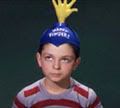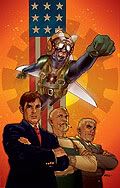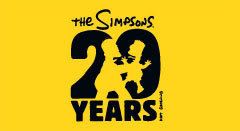Eulogy For My Dad
In loving memory of Robert H. Getz: December 3, 1930 - December 20, 2012
In the beginning there was this very tiny room, and these two other people who were taller than me. We lived in an upstairs apartment that sat at the top of what seemed like an endless flight of stairs, and in that apartment what I remember most vividly was a record player accompanied by the world’s smallest record collection, a handful of albums comprised of titles like Chubby Checker’s Limbo Party, Gene Autry sings Rudolph the Red Nosed Reindeer, and the soundtrack to the Elvis Presley movie, Loving You. In retrospect, they all seem very personal and prescient now: My father was renowned for his ability to do Checker’s signature dance The Twist, he loved the singing cowboys of the movies as he was growing up and, truth be told, for the rest of his life, and the Elvis…well, maybe that was more of a signpost about what was to come, not just for me but all of us.
Of course in time, other people showed up demanding more rooms and larger rooms. It’s difficult to remember how I felt about this at the time, but I can’t imagine I was at all pleased with it. Things kept going from bad to worse until one final move as a family in the 70’s. My Aunt Shirley saw the house before I did and when I quizzed her about it, she just said “Oh, you’ll love it, honey. You’ll be able to be a hermit as much as you want” and, indeed, it had taken years but I once again found myself in a tiny room at the top of a flight of stairs. This had always been the best arrangement, I felt, and after a lifetime of consideration, I had to believe that my parents had finally begun to come around to my way of thinking.
My parents moved to Philadelphia shortly after I was born, but when we would go back to visit, it seemed to me as a child as if they had materialized out of some humid mist of the past, from behind an ancient curtain which lay just this side of words like Scranton, Lackawanna County, Wilkes-Barre and WARM and industries that depended on coal and steel. I knew that my grandfathers had dug coal and there were times during my 20-year tenure at an insurance company that made me wonder if the Getzes had really come very far at all. Beyond this you sensed there were probably albums of sepia-toned photographs that either proved or gave the lie to stories like the one my father’s mother told us about our great-grandfather being the gamekeeper on the Kaiser’s estate. “You know,” she said, “he had to be declared dead before he could leave Germany.” It was all a bit difficult to swallow but we had to admit that our presence in the United States was proof that he had succeeded one way or another. If I had to make an educated guess based on experience and what little I know of our family tree, I figure that he’d probably meant to get off somewhere in the United Kingdom, but overslept.
Thinking back on these early days my memories are scattershot: I can recall my mother working as a waitress at a diner called the El Rancho and my father and I visiting her there. I can remember being fascinated by the water cooler in my father’s office. In fact, our move to Philadelphia had been made because of my father’s job and the fact that my mother was working at some point as well indicates that we needed the money. The difficulty in making ends meet for a family with four children in some ways defined and shaped my father’s life as well as my mother’s. And this, perhaps, was the difference in the generations. Anyone who came of age when I did, post-Elvis and the youth culture he ushered in, became accustomed to the idea of instant gratification and it was our parents’ great misfortune to have to serve that sense of entitlement or suffer the consequences of temper tantrums and pouting faces. Their sacrifices were not occasional or sporadic, but lifelong. They did not have the heart to disappoint us or have us think of them as anything but completely capable of providing anything we wanted. And so, many of us had no idea of the toll that was taken on them and the price that real life sometimes demanded of them. I have a friend about my age that I talk to once in a while about such things and inevitably when we get to the subject of our ages and the list of infirmities that seems to be snowballing, one of us ends up saying, ‘Why didn’t somebody tell us about this?’ which is our way of saying that we grew up being extraordinarily protected from reality and so we find ourselves feeling woefully unprepared for it now. Oh, my father would enjoy the pretense of telling us no, but he just wanted to make us work for it a little bit; there was never any doubt what the end result would be. We were given everything and denied nothing, but as in all transactions of this sort, all accounts are eventually settled regardless of our ability to pay and life finds other ways of demanding its due. So let me say, proudly and publicly, to my Mother and Father, thank you for doing so much and often getting so little in return and, if you can, accept my apologies for what I can only call selfishness. I did not understand. Now I understand.
When my mother died so suddenly, I watched my father shatter as I had never seen anyone shatter, asking me “What am I going to do now?” I had never felt so completely unable to answer anyone. But he persevered, slowly regaining the things that made him who he was, even his sense of humor which was often so dry that it was difficult to tell whether he was speaking seriously or not. Of course, he also had that regulation supply of dad-humor that is always issued to dads at the birth of their first born. Upon meeting my friend Jim for the first time, my father enthusiastically greeted him with a booming ‘Hey, Jimbo!’ This easy and slang-infested familiarity did not sit well with Jim, which basically ensured that every time my father saw him, the first words out of his mouth would be ‘Hey, Jimbo!’ And I would not be at all surprised to discover that my father, using the secret and masonic techniques known to all dads, has somehow arranged for my friend’s own eventual headstone to read ‘JIMBO’ thereby accomplishing the greatest ambition of all dads, that of annoying someone for all eternity.
He was doubly tested when he found himself having to be both Mother and Father to my sister Pam. He was torn in two by his inability to refuse her, as any dad would, and by having to come to terms with her addiction, which meant having to set boundaries. It’s practically an impossible balancing act but I watched him handle it with grace and affection. If she lost that battle, it wasn’t for lack of trying on his part and I hope he realized that.
I remember once telling my mother that I felt that whatever the best parts of my personality were, they had come from her and Dad, a revelation which, my mother later informed me, confused my father a great deal. But the truth of it was that we were for better or worse a very straight middle-class family that had not wandered terribly far from the coal mines of Scranton and it was that sense of grounded and unpretentious middle-classness that I inherited from them that I would treasure more and more as the years went by. This is not to say that I wouldn’t have loved to be in the position to give them millions of dollars. They’d have deserved it all and more. But I’m not sure they would have known what to do with it. Perhaps my father would have looked into whether or not there was such a thing as an Armani pair of Bermuda Shorts. Or maybe my mother would have left her purse open with some hundred dollar bills hanging out in anticipation of my next request for a loan. But at heart they were modest people and I think that sort of wealth would have embarrassed them.
There is so much else I wish I could share with you: the guy who brought me comic books when I was sick; the dad who drove miles out of his way to take me to an art museum simply because I desperately wanted to go; the man who seemed not to be listening when you talked of your ambitions and who would shock you years after the fact by helping you fulfill them; the father who was often too shy to put his feelings too openly on display but who nevertheless had pride in you. And now we have a Lutheran service for a Presbyterian with a eulogy by his Jewish son. If I can paraphrase Walt Whitman, my father was large and contained multitudes. I hope I have managed to practice the values I learned from my father as well as my mother, for as the years go by and I find myself worn smooth like a stone, I see myself more and more for the grain of sand that I am, and my father’s face becomes clearer and clearer in the mirror, as I’m sure it does in my brothers’, and I see less and less the things of this world and more and more the things of the spirit. These things are my true inheritance and the sort of treasure that lives in the heart, and although time may conspire to steal our parents, the things they gave our hearts and minds outlast us all and are immortal and permanent.
















